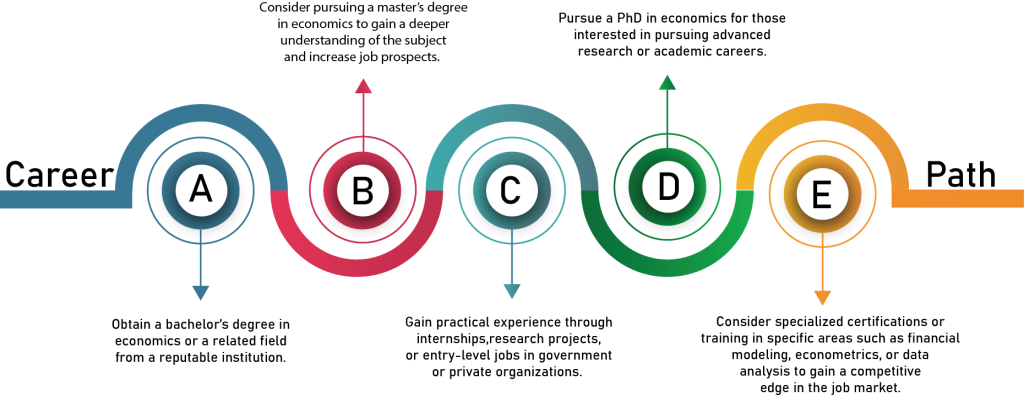An economist is a professional who studies the production, consumption, and distribution of goods and services in an economy. They use mathematical models, statistical analysis, and other tools to understand how the economy works, and to make predictions about future economic trends.
Economists also analyze the impact of government policies, trade agreements, and other factors on the economy. They may work in academia, government agencies, non-profit organizations, or private businesses. Some specialize in specific areas such as finance, international trade, or environmental economics.

Work description
The work description of an economist involves analyzing data and trends to understand how the economy functions and to make predictions about its future performance.
Economists also study the impact of various economic policies, such as taxation, government spending, and trade agreements. They may advise government agencies, policymakers, and businesses on the potential effects of these policies and recommend strategies to achieve desired outcomes.
Additionally, economists may conduct research on specific topics, such as environmental economics, labor markets, or financial markets. They may also write academic papers, articles, and reports to share their findings with other economists and the broader public.
High Demand
There is a high demand for computer engineers, as technology continues to play a crucial role in various industries.
Opportunities for innovation
Variety of job options in government, academia, and private sector.
Versatility
Opportunities for international travel and collaboration.
Flexibility
Opportunities for career advancement.
Job satisfaction
Ability to make a positive impact on society through policy recommendations.
High stress
The fast-paced and constantly evolving nature of the field can create high stress levels, especially when working on complex projects with tight deadlines.
Long hours
Computer engineers may be required to work long hours, especially during critical project phases or when troubleshooting issues.
Competitive field
Due to the high demand for computer engineering jobs, the field can be highly competitive, requiring candidates to have specialized skills and experience.
Constant learning
Computer engineers must constantly stay up-to-date with the latest technologies and advancements in the field, which requires ongoing learning and professional development.
Isolation
Depending on the job and work environment, computer engineers may spend a lot of time working independently or in small teams, which may not be suitable for everyone.
Eye strain and other physical health issues
Staring at computer screens for long periods of time can cause eye strain and other physical health issues, such as back pain and repetitive strain injuries.
The cost of pursuing a career in Computer Engineering in India can vary depending on various factors such as the institution, location, and course duration. However, on average, pursuing a bachelor’s degree in computer engineering from a top-tier institution in India can cost anywhere between INR 5 to 15 Lakhs for the entire course duration of Four Years. Pursuing a master’s degree in computer engineering from a reputed institution can cost anywhere between INR 2 to 10 Lakhs for the entire course duration of Two Years. Additional expenses such as accommodation, food, and textbooks may also add to the overall cost of pursuing a career in computer engineering.
The earning potential of a Computer Engineer in India can vary depending on various factors such as work experience, job role, location, and industry. However, on average, Entry-Level Computer engineers in India can expect to earn anywhere between INR 3 to 6 Lakhs Per Year. With experience and career growth, the earning potential can increase significantly, with mid-career computer engineers earning anywhere between INR 10 to 20 Lakhs Per Year. Senior-Level Computer Engineers in India can earn even higher salaries, with some earning over INR 50 Lakhs Per Year in top-tier companies. It’s important to note that these figures are only averages, and the actual earning potential may vary depending on various factors.
Strong problem-solving skills.
Analytical thinking and attention to detail.
Creativity and innovation.
Ability to work well under pressure and meet tight deadlines.
Good communication and teamwork skills
Passion for technology and eagerness to learn.
Strong foundation in math and science.
Lack of attention to detail or poor organizational skills.
Inability to adapt to changing technologies and trends.
Lack of interest or passion for the field.
Poor communication or teamwork skills.
Inadequate math and science skills.
Impatience or inability to work through complex problems.
Tendency to procrastinate or miss deadlines.
Work-life balance
The work-life balance of an economist can vary depending on the industry and organization they work for.
Economists who work in academia typically have more control over their schedule and workload. They may have to teach classes, conduct research, and attend meetings, but they usually have more flexibility in terms of when and where they work.
Economists who work in government may have more structured schedules and strict deadlines. They may also be required to work long hours during peak periods or when important reports are due.
Economists who work in the private sector may have more demanding work schedules, especially if they work for consulting firms or financial institutions. They may be required to work long hours and weekends to meet client demands or deadlines.
Overall, economists may have to work longer hours or under strict deadlines during certain times of the year. However, many economists are able to achieve a good work-life balance by managing their time effectively and setting boundaries between work and personal life.

Advancements in technology have revolutionized various industries, leading to increased efficiency and productivity.
Computer engineers play a vital role in developing software and hardware that make our lives easier and more connected.
The increasing demand for computer engineers has led to job creation and economic growth in various countries, including India.
Computer engineering has enabled advancements in fields such as healthcare, education, and communication, leading to better access to services and resources.
The increasing reliance on technology has led to concerns about privacy and security, leading to the need for stronger regulations and cybersecurity measures.
The development of automation and artificial intelligence may lead to job displacement and require reskilling for certain sectors.
Artificial Intelligence Machine Learning
Involves developing algorithms that enable machines to learn from data and make decisions without human intervention.
Cyber security
Focuses on protecting computer systems, networks, and sensitive data from unauthorized access, attacks, and theft.
Software Engineering
Involves designing, developing, and maintaining software applications and systems.
Data Science Machine Learning
Involves processing, analyzing, and interpreting large and complex data sets using statistical and computational methods.
Computer Networks
Focuses on designing, implementing, and maintaining computer networks that enable communication and data transfer between devices.
Conclusion:
In Conclusion, pursuing a Career in Computer Engineering in India requires a Strong Foundation in math and science, a passion for technology, and a willingness to continuously learn and adapt to New Developments in the industry. With competitive salaries, opportunities for career growth, and the potential to make a significant impact on society, computer engineering can be a Rewarding and Fulfilling Career choice for those who are up for the challenge.



